Germany: electoral win for conservative right; ideological surge for new far right
A global trend goes up a notch as the vote share of Labour's centrist soul mates in Germany sinks to lowest level since 1949 and its worst defeat since 1887.
Cover photo: Yes, conservative Friedrich Merz is set to be the next German chancellor, but Alice Weidel and her far right AfD party are the real winners of Sunday’s Germany elections, say many commentators.
To sum up Sunday’s general election in Germany in a single sentence:
A staunchly pro-capitalist conservative party won the most seats, a far-right party finished second, but made the biggest impact, the centrist Social Democrats got creamed, the Greens stumbled, one left party did far better than expected, while another recently-created left party may not even get any seats in Germany's parliament; a coalition government is expected perhaps by Easter; stormy times, and perhaps re-building times, lie ahead.
Or as one journalist wrote on Saturday before the votes were even cast: “The far-right party, predicted to finish second in tomorrow's election, doesn't need to win—core parts of its agenda have already become mainstream.”
Today’s issue of THE LEFT LANE features assessments by two knowledgeable left-wing commentators on German politics about what the results mean.
++++++
+++++
First: a brief backgrounder to the unexpected calling of this election and an explanation of how German elections are conducted.
Under its leader Olaf Scholz, the Social Democratic Party(SPD) became the leading party in Germany as a result of the 2021 election and formed a coalition government, as is typical in Germany, with two other parties: the Greens and the Free Democrats.
But it became an often feuding and ineffective coalition and it fell apart in November 2024. Normally another election wouldn't be held until September 2025. But the collapse of Scholz’s government necessitated Sunday's vote that resulted in a tumultous SPD defeat, its worst since 1887.
In brief, this is how Germany operates its elections to its 630-member Bundestag ( or National Parliament) ; see HERE for a fuller explanation.
Germany uses what is called a “mixed member proportional electoral system.” Voters receive two ballot papers. Seats are won BOTH under a first-past-the-post system (FPTP - as in the UK) and a proportional representation system (which is the more democratic method used in almost all European countries.) The latter component means that seats won much more closely mirror the actual wishes of voters as they did on Sunday. No party winning 34% of the overall vote, as Starmer’s Labour did in July 2024, could ever win a landslide in Germany.
To enter the Bundestag, a party must EITHER get 5% of the nationwide second vote (as determined by PR) OR win three constituencies via first votes (based on FPTP). The 5% threshold is critical. The BSW party, mentioned in the two commentaries below, got only 4.972 % of total vote and it appears BSW will not have any members in the Bundestag.
Election winner Friedrich Merz, who leads the Christian Democratic Union (CDU) which received the highest vote share, said late Monday that he has begun talks with SPD. The aim? To form a coalition government in Europe’s most populous country and home of the world’s third largest economy. It is worth staying tuned in.
++++++
Alternative für Deutschland (AfD) were the real winners of Germany’s election
By Carla Roberts
The clear winner of one of the most hard-fought election battles in German history is the Alternative für Deutschland (AfD). Although there is no chance of it joining any government coalition anytime soon, it has pushed all parties to the right – bar Die Linke, which, almost by accident, ended up moving slightly to the left.
Just a few weeks ago, Die Linke had been hovering around 3% in the polls. But then it rediscovered its left-liberal roots, just in time. For the first time ever, they stood on a manifesto in which they didn’t offer themselves up as a cheap coalition partner – but a clear opposition party (“Alle wollen regieren, wir wollen verändern” – ‘everybody wants to govern, we want to change things’). Its declaration of “solidarity” with refugees and migrants stood out like a sore thumb in the campaign. As did its commitment to oppose any weapon exports (we would, however, criticise its mealy-mouthed support for Zelensky and a so-called ‘two state solution’ in the Middle East).
The new Bündnis Sahra Wagenknecht (BSW), which split from Die Linke last year, increasingly tried to ape the AfD. The nail in the coffin was Wagenknecht’s demand for a “national referendum on migration”, which she hoped would decrease migration from the current 500,000 to 50,000. No surprise that many voters chose ‘the real deal’ AfD instead.
The Greens also stumbled
The Green Party also badly stumbled. Just before the elections, lead candidate Robert Habeck (who resigned on Monday) published a nasty 10-point-plan to reduce migration. After a rebellion within the party, he had to water down the plans, but the damage was done. Add to that the fact that the Greens have long been the most vocal supporters of Zelensky in a war that has now been shown as entirely pointless by the president of the USA – and it is almost a surprise they did not do worse.
The issue of migration was just a reflection of a much bigger problem. Capitalism is in international decline, with a stagnating global economy aiding the rise of irrationality and fear of ‘the other’. A fertile ground for the populist right and its easy answers. It explains why the AfD did particularly well in the east of Germany, where many still see themselves as ‘losers’ of the reunification of 1989. We should be careful to stick the label ‘fascist’ or ‘racist’ on those voting for the AfD or Donald Trump that matter. Many of those are the biggest victim of an increasingly brutal capitalism. And with ‘King Donald’ rewriting all the rules in an attempt to hold on to US hegemony, worse is yet to come. Neo-liberalism and US rule by apparent cooperation is dead; long live the new sheriff in town, who is ruling by fear.
The new government coalition will be faced with the huge problem of what to do about Trump and his pursuit of a weak Europe. Will Friedrich Merz really rebel against Trump and continue to pump billions into the war in Ukraine? The war after all has made a dire, post-Covid economic situation ten times worse. German industry has suffered greatly from the CIA-directed sabotage of Nord Stream 1 and 2, which would have supplied the country with much-needed, cheap natural resources. In addition, massively increased interest rates and a stagnating global economy has hit German exports hard.
Giving in to Trump is no answer either
Pursing the war in Ukraine will not go down well with many in Germany, especially those who support the AfD, who was most outspoken in its opposition. But simply giving in to Trump and pulling out of Ukraine will make the new government look like a total pushover and the sacrifices of the last three years entirely pointless. There will be pressure from other EU countries as well to continue support for Ukraine – as a way to justify the existence of the EU itself, which Trump clearly wants to do away with.
Perhaps they will even be pushed into reviving the old idea of a real European government with a real European army. That would set up a clear and potentially very dangerous confrontation with the US government. Germany has gone from Europe’s powerhouse to its powder keg.
Yet there is some hope for the future: Among young people, Die Linke was the clear winner. In a (non-binding) traditional election among under 18-year-olds, in which almost 170,000 young people took part, it came a clear first, with the Greens in fifth place.
+++++
Born in Germany, Carla Roberts writes for The Weekly Worker. There will be a longer analysis of the German election in this week’s issue that you can access HERE (later on Thursday, 27 February.)
Some good news…
This bar graph shows the voting choice made by first-time German voters in Sunday’s elections. ( The figures in the second colum show the change from the last election in 2021).
++++++
Many losers and few winners in German vote
By Victor Grossman
There were many losers and few winners in the German elections. The party with the most votes, but weaker than in many years, was the Christian sister team called the “Union.” Its top man and future chancellor is Friedrich Merz, a millionaire who, in a pause from politics, was a financial lobbyist and headed the German section of the huge asset manager BlackRock. Its solution for Germany’s current economic distress: lower taxes on wealthy corporations, cut benefits for the “lazy” jobless, immigrants, children and seniors, many of whom face poverty. Billions can then be spent on giant armament build-ups and reparations for an openly planned conflict with Russia.
But this Union requires a partner to win a needed 316-seat Bundestag majority. The Greens, only faint echoes of their radical past, lead war fever with their “ruin Russia” policy and increasing comfort with big business. But their poor electoral showing gives them too few seats to provide a majority.
So Merz must turn to the Social Democrats. Their results, the worst since 1949, provide just barely enough seats to paste a coalition together. It would most certainly be without its current leader, Chancellor Olaf Scholz, who is largely blamed for the distress of his party and Germany.
Björn Höcke, a particularly extreme AfD state leader.
A German far right march in 2021. (Both above photos by Fabian Ritter for The Guardian)
The big vote winner was the far-right Alternative for Germany (AfD), doubling its 2021 vote and winning in all five states in the former East Germany. While calling for peace in Ukraine (its one good card), it builds on hatred toward immigrants and all “foreigners”, supports Netanyahu to the hilt, as well as armaments, conscription and German dominance. But it is still too radical to be accepted as a partner by the Christians, although the so-called “stone wall” separating them shows signs of crumbling.
Recalls votes for Nazis in the 1930s
The AfD result - 20.8% - recalls the Nazis’ vote of 18% in 1930, up 2.6% from 1928, then its 37% result in July 1932 - clearly thanks to the Depression. Does Germany now face a new Depression?
The other surprise was the LINKE party. It was split a year ago when the highly articulate and charismatic Sahra Wagenknecht formed a new party named after herself. It surprised Germany by eclipsing its parent party in last year’s European and East German elections, while the LINKE party, with a sickly 4% average, seemed doomed.
But on Sunday it was LINKE’s turn to amaze everyone. Finally drawing conclusions from its reformist positions, which made it seem part of the establishment, the party turned instead to vigorous protest. Though still divided on important questions (with some leaders nearing a pro- NATO tolerance, bowing to government and media pressures, even support for Zelenskyy and Netanyahu), LINKE decided to steer away from these questions, at least during the elections. Instead, it adopted a plan to visit many thousands of households and ask what people wanted.
LINKE then focused on their major worries: fuel and grocery prices and, above all, the lack of affordable housing and frightening rent increases. With three elder leaders (Three Silverlocks”) and charismatic young female leaders in TikTok appeals and, quite alone among the parties, supporting immigrants’ rights, it gained thousands of new members, mostly young, and soared in two months from 4% to its amazing final total of 8.8%!
The Wagenknecht party, no longer seen as a protest leader and sticking close to the AfD on immigrant questions, dropped to a heartbreakingly close 4.972% election result, thus losing by 14,000 votes its further existence in the Bundestag , and perhaps its further existence.
LINKE takes Berlin
The most spectacular LINKE success was in Berlin. It won first place here with 19.9%. That put it ahead of the governing parties, Christians and Social Democrats, and all others, overcoming years of decline by winning direct seats for four Bundestag candidates, includes veteran leader Gregor Gysi, vigorous young party chairwoman Ines Schwerdtner, and two militant young men with immigrant background, one, a precedent, in a former West Berlin borough.
Berlin is not Germany, but its capital. Yet its victory here is double its last Berlin result in the 2021 election, and it now has 64 Bundestag seats (out of 630). If its compromising “reformers” can be weakened, this election could just possibly herald the urgent resurrection of left-wing opposition against the frightening war-like build-up in Germany, plus France, Poland, Britain and others. It is a spark of hope, which may aid and comfort comrades in those other countries.
Victor Grossman, originally born as Stephen Wechsler in 1928 in New York, fled harassment as a Communist in the McCarthy era by swimming across the Danube to the Soviet Zone of Austria in 1952. After being sent t the GDR, he worked, studied, raised a family, directed a Paul Robeson Archive, then became a free-lance journalist and author, which he still is! (His most recent book: “A Socialist Defector: From Harvard to Karl-Marx-Allee”) can be accessed HERE / victorgrossmansberlinbulletin.wordpress.com
CHECK THIS OUT
Time again for some good news.
I heard Peter Mertens, Secretary General of the Workers’ Party of Belgium (PTB/PDVA), speak in November and wrote about his stimulating talk that evening HERE.
And I may come down from Norwich again on 18 March. A socialist party with more than 25,000 members in a country one-sixth the size of the UK surely has something to teach us.
Definitely worth booking your place HERE.
++++++++++++++++
Edited by Alan Story, THE LEFT LANE is a reader-supported publication. To receive new posts and support our work, consider becoming a free or paid subscriber: http://theleftlane2024.substack.com/subscribe
You can reach us at: theleftlanepolitics@gmail.com
Read all previous columns of THE LEFT LANE ( 66 in total) here
Follow us on THE LEFT LANE Instagram and on THE LEFT LANE Bluesky: https://bsky.app/profile/leftlanepolitics.bsky.social

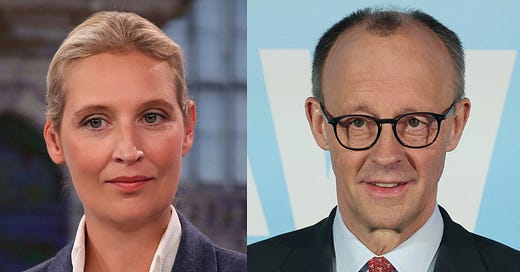



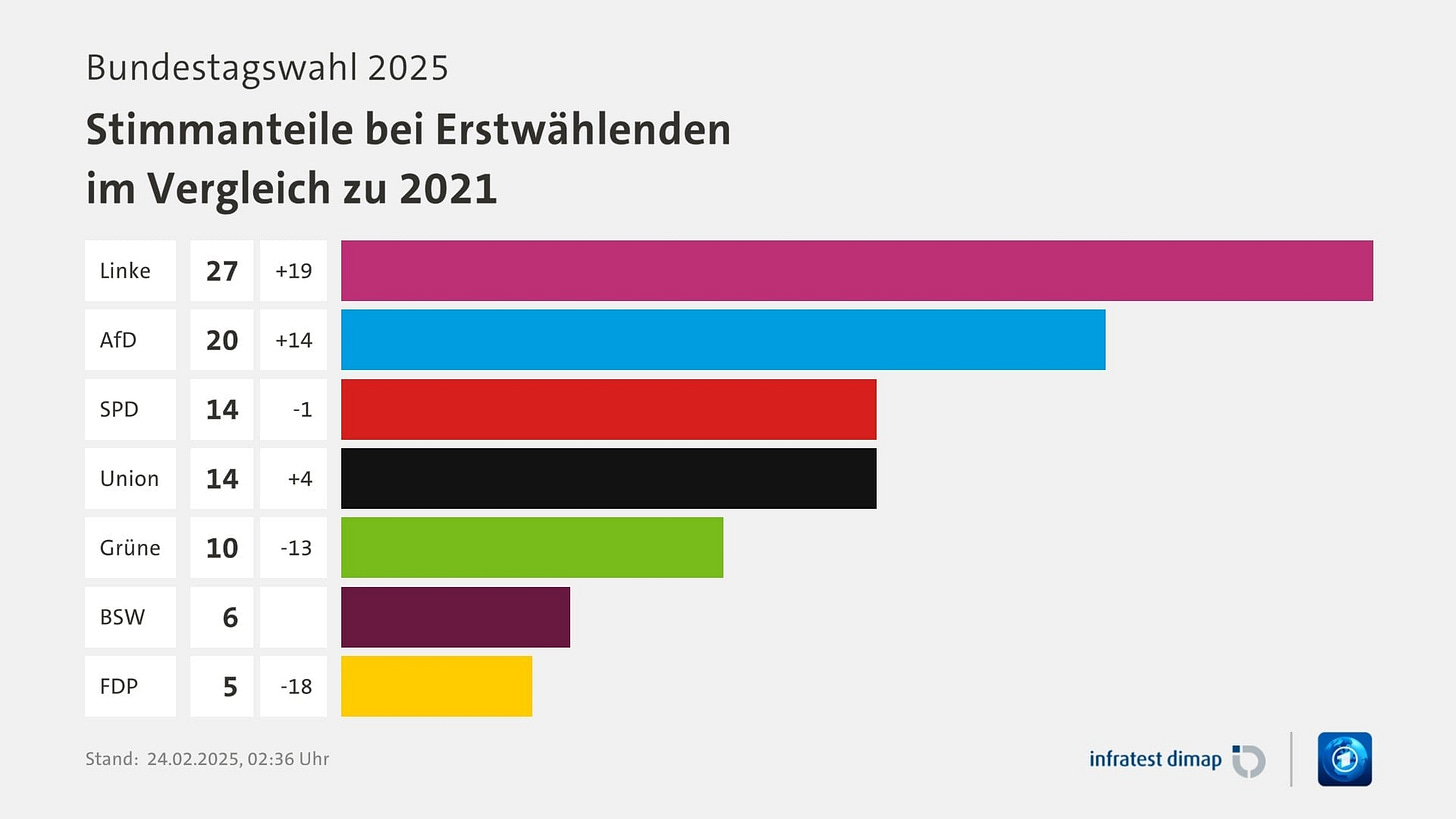
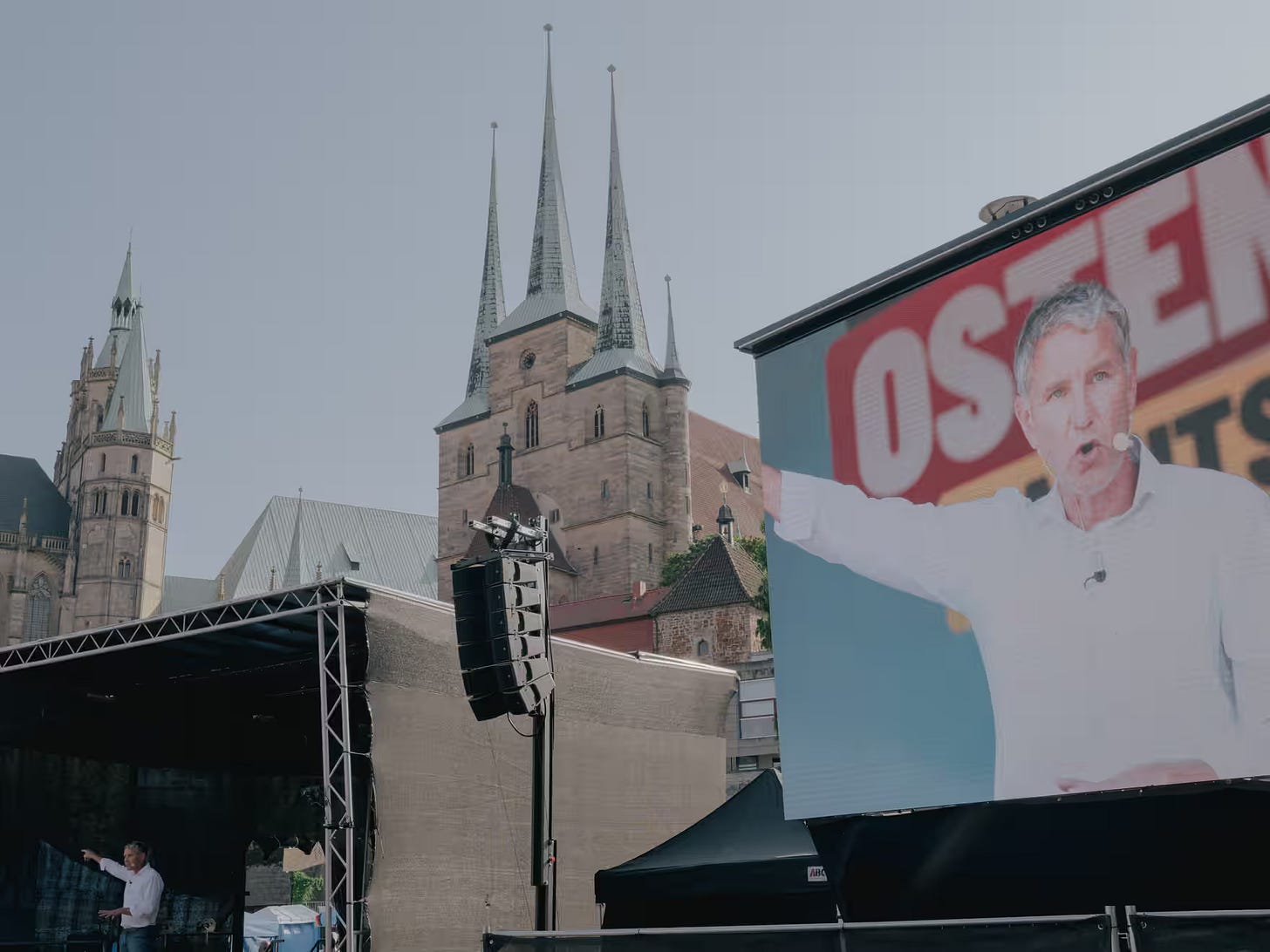
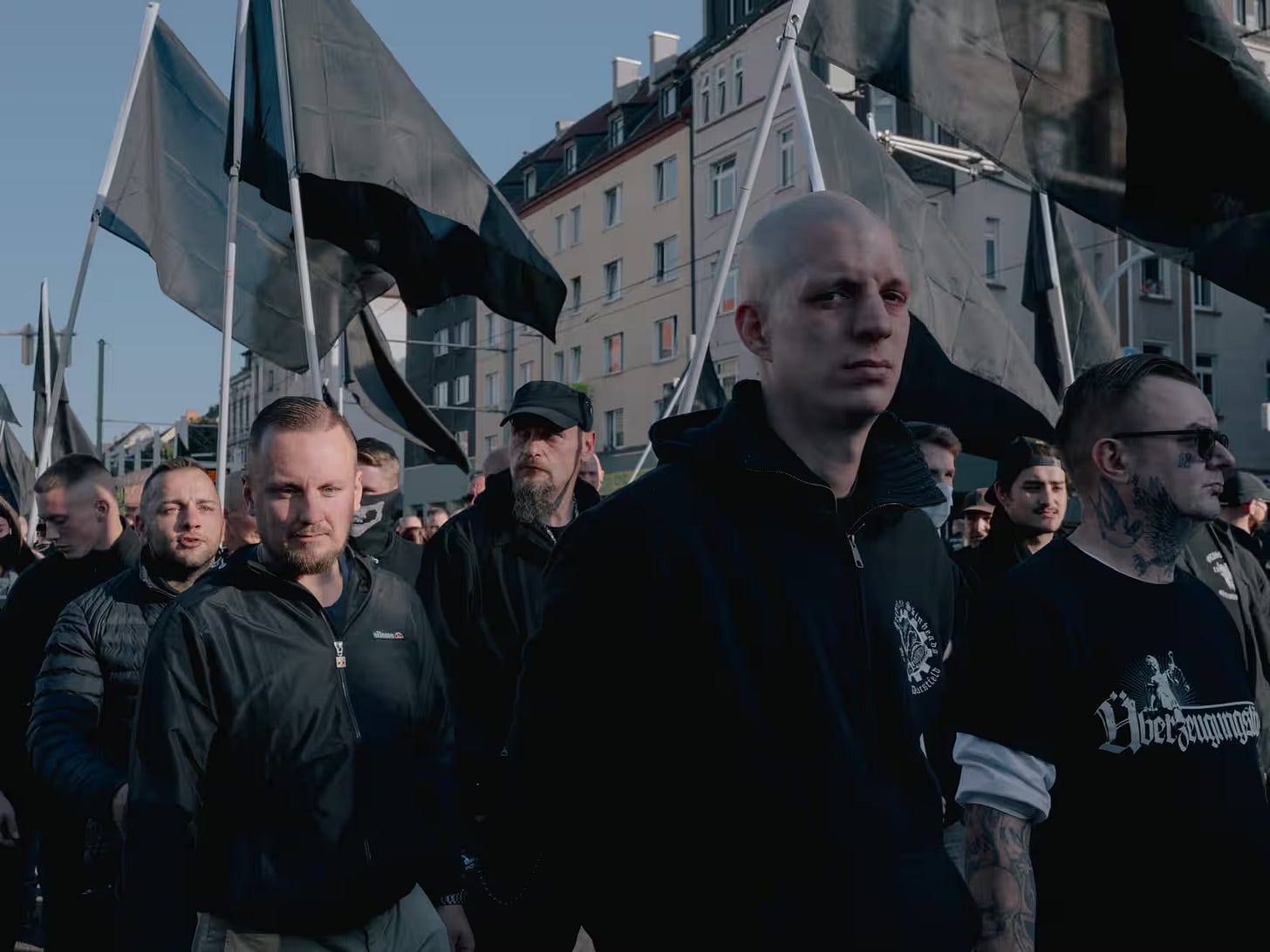

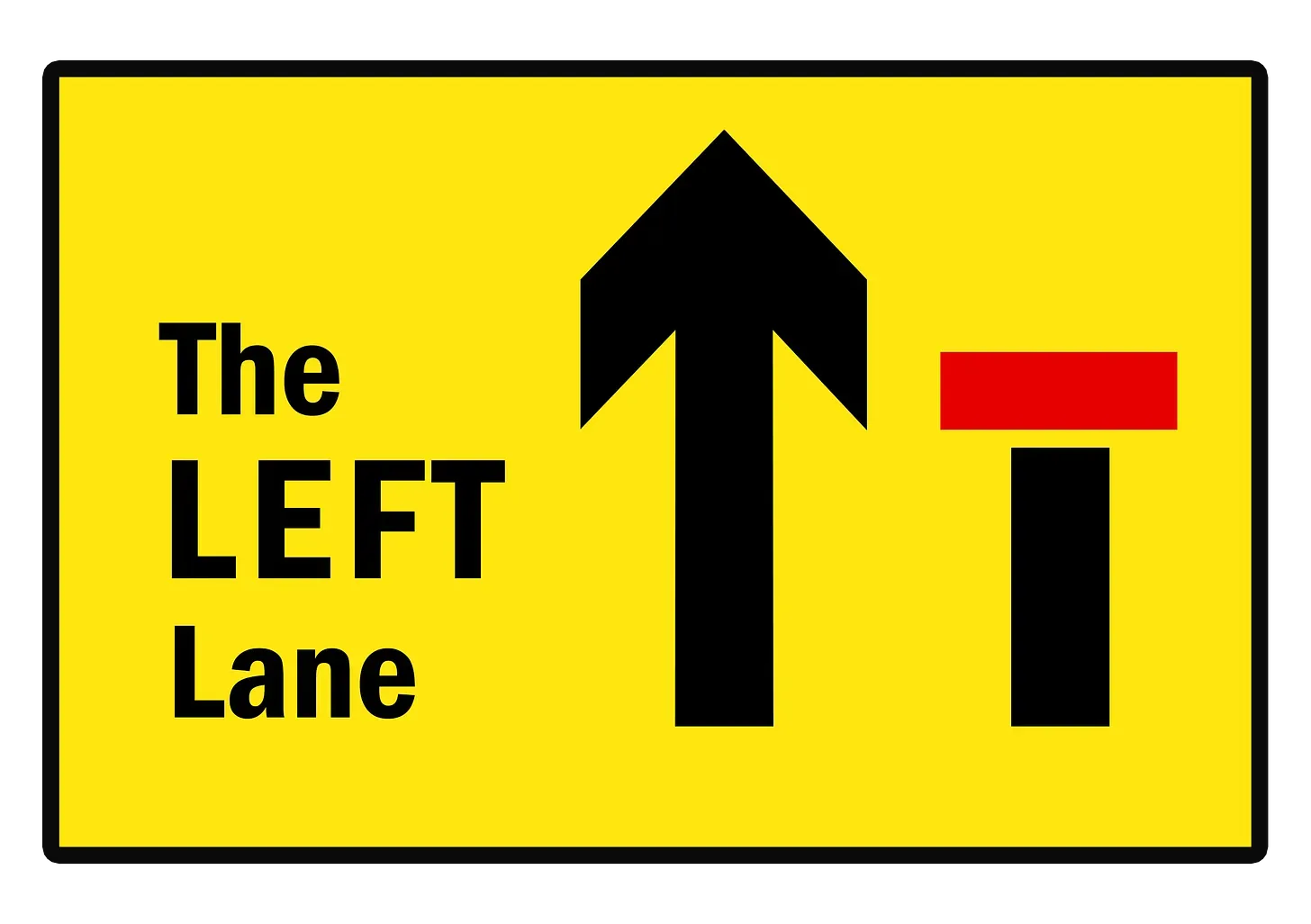
Another good article on Germany's election: https://www.rosalux.de/en/news/id/53135/the-2025-german-election-first-impressions-and-implications